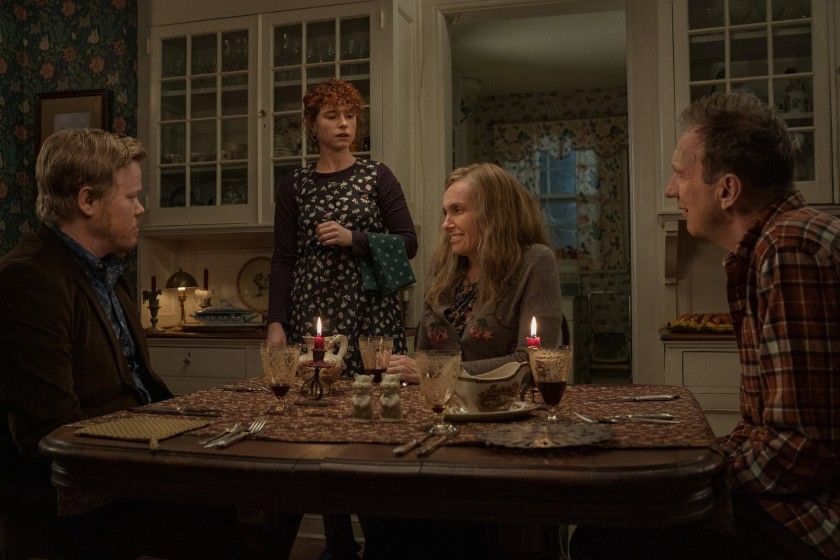I Finally Watched I'm Thinking Of Ending Things!

Initially, I’m Thinking Of Ending Things grabbed me because it was the most Charlie Kaufman movie I’d ever seen with the least focus on Charlie Kaufman in it (confession: I’ve yet to see Anomalisa). For all the imagination and surreality of the films he’s written, they’ve basically always centered on a sadsack. John Cusack’s hapless puppeteer pining for validation from Catherine Keener’s boss-ass bitch in Being John Malkovich. Jim Carrey’s lovestruck shmuck pining for validation from Kate Winslet’s conflicted dream girl in Eternal Sunshine Of The Spotless Mind. In Adaptation, Nicolas Cage literally played the writer trying to figure out how to milk validation out of Meryl Streep’s Susan Orlean’s memoir. Kaufman’s directorial debut, Synedoche, New York, was nothing but Philip Seymour Hoffman’s MacArthur grant winning director haplessly searching for meaning in art & companionship, his cast and family blurring as dreams of transcendence and satisfaction collapse into decrepit mortality. They’re all audacious and unprecedented in their ways, but still concern a world, however menacingly, revolving around a pretentious dude who just can’t win. And, usually, he doesn’t deserve to.
For the length of a breezy little comedy, I’m Thinking Of The Ending Things conveys what it might be like to date this guy. Jessie Buckley plays a young woman not unlike Winslet’s Clementine - striking wild hair and immaculately careless clothes, snarky only-in-the-movies flat American mutter (Buckley’s Irish, Winslet’s English) - tagging along to visit the parents of her new boyfriend Jake (played by Jesse Plemons, never more Philip Seymour Damon in his subtly commanding, vaguely untrustworthy presence). Stating the title in voice-over before she’s even gotten in the car, we hear her internal debate over the pro-and-cons of continuing to date him, everything from his emotional neediness to his taste in music to his facial hair. Jake is distinctly on the outside of this narration, practically conscious that it exists and desperate to hear it.
Despite the depth of her observation - she gets to deliver an entire poem about the futility of “going home,” look directly into the camera at its climax and zing Jake for merely responding with “wow” - we’re gradually given more and more peculiar hints that this world sees her as a replaceable battery to drain. Jake’s parents (played by Toni Collette and David Thewlis) take oppressive in-law cliches to disorienting, nightmarish heights. Ending Things would be a terrific double-bill with Hereditary, another film where Collette portrays an American mother like an desperate, barely restrained banshee in claustrophobic quarters while the grizzled, veteran actor playing her avoidant husband doesn’t bother hiding his accent (Thewlis’ English, Gabriel Byrne’s Irish). But where everyone in Hereditary seems cruelly cursed, Buckley just has to decide how long she’ll choose to suffer the shifting, collective neurosis of this family that distinctly isn’t hers: the only real threat is continued embarrassment. During this opening stretch, I’m Thinking Of Ending Things comes off as a hysterically ruthless horror-comedy about surrendering your identity to a romantic unit. By giving the sadsack’s muse some degree of agency and authority, I’ve never found Kaufman’s fantastic self-loathing funnier.

In an inspired, ironic stroke for a movie steeped in the male gaze, the female lead is given an excess of character detail. Her name suddenly changes. Her reasons to head back to the city are always impressive but never the same. Unexplained cutaways to an elderly school custodian show him watching a romcom climax where the actor tells the actress he’s the only one that really appreciates her. Is Buckley playing one bright woman or every bright woman to ever enter Jake’s life? At one point her POV rests on a copy of Pauline Kael’s For Keeps in his childhood bedroom. Leaving the home in a blizzard, she delivers a scathing excerpt from Kael’s A Woman Under The Influence review verbatim, Jake struggling to defend the John Cassavetes film. We’re never even told that she’s quoting Kael, and Kael’s review isn’t even in For Keeps! I knew what was happening because I read every review Pauline Kael ever wrote when I was an undergrad, and have For Keeps and five or six other compendiums still on the shelf. (By the way, I’m in love with Jessie Buckley now and would pay so much money for an audiobook of her rattling off Kael reviews in that Jennifer Jason Leigh period piece imitation. Please God, I need this.) The average viewer of this film will never realize they saw the male auteur have the female lead directly quote a female critic about the failure of another male auteur’s attempt to tell a woman’s story, the male lead then saying he found Cassavetes’ attempt to sympathetically write a female lead affecting all the same. I believe Prince called this "the dream we all dream of: boy vs girl in the world series of love." Layers!
Though I thoroughly enjoyed the first 90 minutes of the movie, I couldn’t help but note the little red line when paused still had more than a half hour to go. As Jake drags his girlfriend along to a rural high school, mansplaining the nature of reality, I assumed we might be headed towards the male gaze/auteur/lead overtly taking the wheel of a narrative it’s actually owned all along. Then it seemed like we weren’t, at least in terms of the story. Then it is was clear that we were. Sorry so self-indulgent and ambiguous, but it’s pretty damn self-indulgent and ambiguous.
Looking up the source material, a 2016 novel by Iain Reid, it’s clear the book lays out What Really Happened a little more decisively, and I give Kaufman credit for avoiding some dull, overt Fight Club/Donnie Darko explication. Even if he still hasn’t transcended - or even really attempted to transcend - the “one-man pity party” (as Stephanie Zacharek described Anomalisa - I needed spoilers about Kaufman’s creative evolution), I’m Thinking Of Ending Things extends a little more sympathy towards those who pay witness to pity parties, from the critics to the significant others. If Kaufman keeps it up - or rather, stops the movie while he’s ahead - the next one might be a party for everybody.